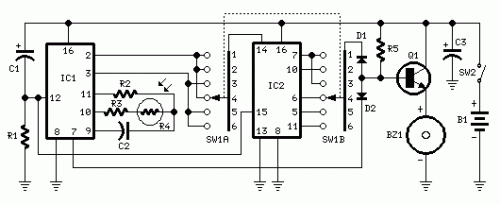similar circuits
- Long Delay Timer Circuit: 35 Minute Battery-Powered Design
- Build Your Custom 3-9 Minute Beep Timer Circuit
- Build Your Amplifier Timer Circuit – 15 Minute Delay
- Timed Beeper Circuit: Build Your Precise Timer!
- Build Your 30-Minute Bedside Lamp Timer Circuit
- Time Delay Circuit: Build Your Appliance Protector
- Midnight Security Light Circuit: A 1:00 AM Intrusion Defense
- Delay Relay Circuit: 12V, 15s
- Build a Powerful 1300W Space Heater Circuit Diagram
- Building a 1-Second Delayed Pulse with the 555 Timer
- 555 Timer Mono Stable Circuit Design & Build Guide
- Build Precise Time Delays with a 12-Stage Binary Counter
- Time Delay Circuit: 5A Output from Low Voltage Batteries
- Build a Powerful 1300W AC Heater Circuit Design
- Build Your 9-Second LED Timer & Relay Circuit 9V
"
Tan Timer Circuit: Build Your Perfect Sun-Kissed Schedule
The following circuit diagram presents a collection of timing configurations tailored to accommodate diverse skin types.
The timer’s operation is influenced by the intensity of ambient sunlight.
Circuit Diagram
Components:
- R1 47K 1/4W Resistor
- R2 1M 1/4W Resistor
- R3, R5 120K 1/4W Resistors
- R4 Photoresistor (any model)
- C1, C3 10µF 25V Electrolytic Capacitors
- C2 220nF 63V Polyester Capacitor
- D1, D2 1N4148 75V 150mA Diodes
- IC1 4060 14-stage ripple counter and oscillator integrated circuit
- IC2 4017 Decade counter with ten decoded outputs integrated circuit
- Q1 BC337 45V 800mA NPN Transistor
- SW1 Six-way Rotary Switch (refer to included documentation)
- SW2 SPST Slider Switch
- BZ1 Piezo sounder (incorporating a 3KHz oscillator)
- B1 3V Battery (two 1.5V AA or AAA cells connected in series, or equivalent)
Device Purpose:
This timer was specifically designed for individuals seeking a tan while simultaneously minimizing their exposure to excessive sunlight. A Rotary Switch is utilized to set the timer according to six distinct Photo-types (as detailed in the accompanying table). A Photoresistor extends the pre-set time duration contingent on sunlight brightness, as outlined in the table. Upon the expiration of the preset time, the beeper emits an intermittent signal. To cease the signal, a complete power-off of the circuit via SW2 is required.
Photo-Type, Characteristics and Exposure Time
- I & Children: Light-eyed, red-haired, light complexion, freckles – 20 to 33 minutes
- II: Light-eyed, fair-haired, light complexion – 28 to 47 minutes
- III: Light or brown-eyed, fair or brown-haired, light or slightly dark complexion – 40 to 67 minutes
- IV: Dark-eyed, brown-haired, dark complexion – 52 to 87 minutes
- V: Dark-eyed, dark-haired, olive complexion – 88 to 147 minutes
- VI: The darkest classification – 136 to 227 minutes
- Note: Pregnant women should be classified as Photo-type I.
Notes:
- If only one time setting suitable for your particular skin type is desired, the rotary switch can be replaced with hard-wired connections.
- A DIP-Switch can be substituted for the rotary switch. However, exercise caution and ensure that a switch is only activated when the device is powered off, as this prevents potential damage to the integrated circuits.
author: RED Free Circuit Designs
circuit from http://www.redcircuits.com/
circuit from http://www.redcircuits.com/
